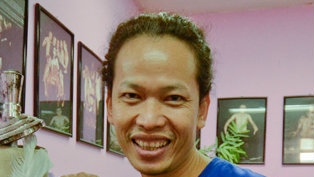Tucked away in the center of Patpong, Bangkok’s notorious red light district, is a small clinic that provides HIV testing and counselling for sex workers and men who have sex with men (MSM).
This is where former sex workers now work as peer HIV/AIDS educators. Among them is 42-year-old Chamrong Phangnongyang. He helped found the Service Workers in Group (SWING), a non-profit organization that provides information, support and condoms to male sex workers.
SWING recently expanded their services from male sex workers to MSM to help raise awareness about the severity of HIV among this group.
“This weekend I will join a big group of MSM to Korat, northeast of Bangkok, to watch a traditional Thai dance show. We know the real purpose of the outing–it’s not to watch the show,” Chamrong says.
“Our team will try to blend in the group. We will bring thousands of condoms to distribute,” he explains. “We will let them know that there are clinics that provide HIV testing anonymously and for free.”
Of the 185,000 MSM population in Bangkok, 1/3 are at high-risk of HIV – they are young, have multiple partners, and often don’t have safe sex. Only 27% of MSM were tested for HIV in 2011.
“Sex workers generally understand the importance of protection. HIV among them is rare. It is why we must work beyond this circle and reach MSM as well,” says Chamrong.
Using Innovation
While community-based outreach remains at the core of SWING’s activities – they hold workshops in bars before they open, walk along popular stretches to distribute pamphlets and encourage health checkups – more innovative ways are now being used to reach MSM.
Online social networking sites like Camfrog and LINE are being introduced. Peer educators and volunteers join chat groups, providing information on why early testing is important and where they can go get tested.
One such resource is Adam’s Love, a website hosted by the Thai Red Cross, and is one of the most effective means to recruit MSM for HIV testing.
Way Forward for Bangkok
Thailand provides one of the most progressive and comprehensive antiretroviral programs in the world – providing free HIV testing at clinics and hospitals. However, the number of MSM who uses these services in Bangkok remains low.
As a result, there are very large empty spaces at health facilities that aren’t being used in Bangkok.
“Of over 90 medical facilities that conducted HIV testing and treatment in Bangkok, only two reach high capacity,” says Sutayut Osornprasop, World Bank Human Development Specialist. “It is important to raise awareness of all the different health facilities that are available for MSM. Scaling up early testing and treatment will save lives, while saving costs.”


